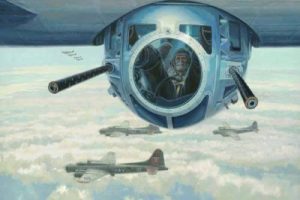Hi readers,
My ASTU class at the University of British Columbia is currently studying poetry. We have read multiple poems some of which are standard contemporary poetry while others are more experimental and abstract. Two poems we had studied that I found to be interesting in how they contrast each other are In Flanders Fields by John Mccrae and The Death of the Ball Turret Gunner by Randall Jarell. The two poems are both centered around war, however their tones are remarkably different.
In Flanders Fields is a poem that was written during the first world war at the battle of Ypres by Canadian medic John Mccrae. Mccrae died in combat before the poem reached its popularity, but today it has become the classic reading for every Remembrance Day ceremony throughout Canada. I have heard the poem since I was in elementary school, and it has always left me with a sad but hopeful feeling after hearing it, and as a kid I always thought of the sacrifice of those who died protecting our values. Today the poem still leaves me with the feeling of hope due to the symbolism of phrases like “the torch; be yours to hold it high” (line 12), and I can see why the Canadian government would use a poem like this to promote the war effort. The poem is set up in a lyric format, and its censoring of the true horrors of war make it perfect for gathering support for the war effort. This is a very different tone to the poem by Randall Jarell.
 Image of A Ball Turret Gunner
Image of A Ball Turret Gunner
The Ball Turret Gunner is a dark short poem that was written during the second world war from the point of view of a gunner. For context, a ball turret gunner was the gunner at the belly of the plane usually a bomber, and it was considered the most dangerous position on the aircraft. Unlike Flanders Field, the Ball Turret Gunner shows the true gore and reality of war, and does not glorify the war effort. The tone of the Ball Turret gunner does not inspire hope, but instead makes the reader feel hopeless and depressed with lines like “when I died they washed me out of the turret with a hose” (line 5). This tone while more realistic to what war is in reality could not be used as propaganda. If this poem had been used in world war two it would have caused a collapse in support for the war. This raises the question of whether poetry during times of war should be censored to preserve a countries morale.
Poetry has the power to evoke powerful emotions, and as seen in the two poems can be used to evoke feelings of hope or helplessness. This is the reason that poems during times of war are often censored in order to protect a countries morale. This could be considered the restriction of free speech, but in wars like world war two if the allies had lost the will to fight Europe would have remained under the shadow of fascism. The two poems though both about war have drastically different effects on its readers, and the context around when it is written can often decide whether it becomes popular or obscure.
Citations
https://www.poetryfoundation.org/poems/47380/in-flanders-
fieldshttps://www.poetryfoundation.org/poems/57860/the-death-of-the-ball-turret-gunner
https://www.tumblr.com/tagged/ball-turret-gunner